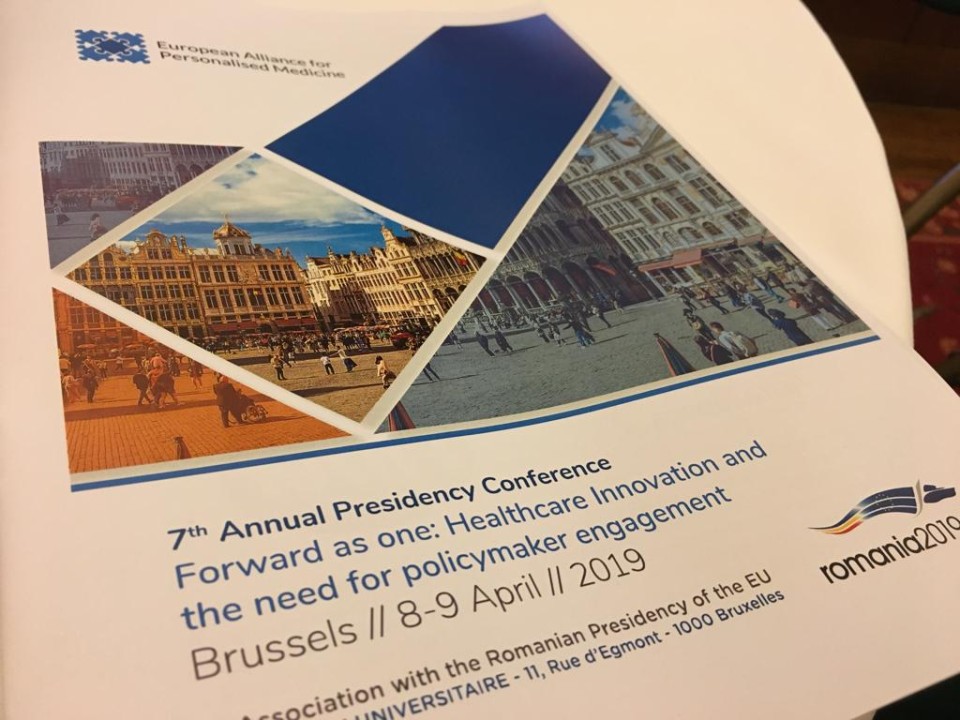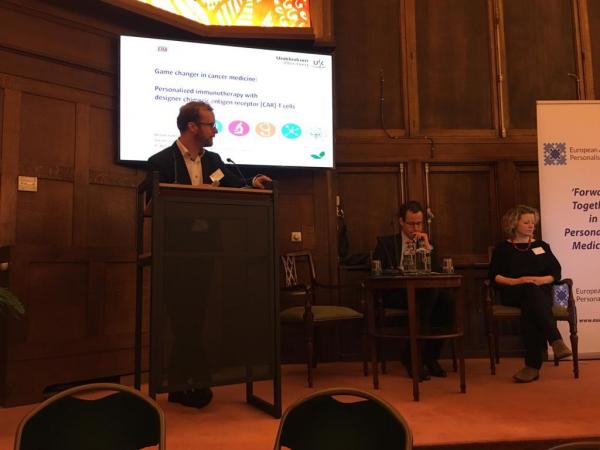This information originally appeared on the previous EHA website. Links to other pages may be inactive.

April 9, Brussels - The European Alliance for Personalised Medicine is holding its 7th annual presidency conference at the University Foundation in Brussels, and the event will include a session on Hematology - Personalised treatment and personalised prevention.
The conference as a whole is entitled "Forward as one: Healthcare Innovation and the need for policymaker engagement”, serves as a one-stop shop, as stakeholders from every discipline and every Member State come together to forge the way ahead. Every year, it is attended by large numbers of industry professionals, government regulators, patients, academia, researchers, healthcare journalists and others interested in driving insights into action.
The burden of blood disorders
Hematological malignancies (HMs) are a heterogeneous group of diseases of diverse incidence, and prognosis, and comparison of HM incidence across regions and over time is complicated by the existence of different disease classification systems and more.
Obviously, incidence is one of the biggest and best measures of burden in a population, serving as a vital guide to the allocation of resources.
Figures suggest that healthcare costs for each patient with blood cancers reach twice the figure compared to average cancer costs. The total cost of blood disorders – malignant and non-malignant – to the European economy was in the region of €23 billion in 2012 and is only moving higher.
Blood cancers are in the top ten of the most common forms of cancer and are responsible for approximately 100,000 deaths in Europe every year.
These cancers present a serious medical and financial challenge and account for about 40% of cancer cases in children and about one third of overall cancer deaths.
Some of the most critical cancers are Multiple Myeloma, Acute Myeloid Leukemia, Acute Lymphoblastic Leukemia, Chronic Lymphocytic Leukemia, Non-Hodgkin’s Lymphoma, Myelodysplastic Syndrome, and Pediatric Hematological Malignancies.
The challenge of treating blood cancers lies in the fact that individual cancers usually need specific therapies, and information about which treatments/interventions work and which do not is often circumscribed by national boundaries and by the legally imposed confidentiality requirements inherent to each national healthcare program.
A new generation of advanced gene and cellular therapies is vastly increasing the possibilities to tailor diagnosis and treatment to individual patients. However, lack of coordination and cooperation between EU Member States, combined with the high cost of developing and administering such therapies, pose a threat to the rapid development and uptake of these treatments across Europe.
Making innovation accessible and affordable across Europe
Today’s session will highlight the innovative ways in which hematology contributes to the personalization of treatment, diagnosis and prevention – with CAR T-cell therapy and the development of a European approach to tackling Sickle Cell Disease as eye-catching examples. Crucially, it will address the need for guidance and coordination at the European level in order to ensure that EU patients optimally benefit from such innovative approaches, while keeping them affordable for public health systems.

Prof. Michael Hudecek introduces CAR T Cell technology on behalf of EHA.
Ahead of the session, the European Hematology Association’s Carin Smand said: “Blood disorders are not only a burden for patients, but also for society as a whole, with about 80 million people having either malignant or non-malignant hematological disorders. We need to urgently step up how Europe tackles this.”
“Blood disorders are not only a burden for patients, but also for society as a whole, with about 80 million people having either malignant or non-malignant hematological disorders. We need to urgently step up how Europe tackles this.” - Carin Smand, Executive Director, EHA
“This session is designed to engage with all relevant stakeholders in the arena of hematology and, obviously, the personalised medicine conference is the ideal place to do this", she added.
“Policy is important and, fortunately, many MEPs are knowledgeable and active in the fields of cancer, including those of the blood," said Marian Harkin, Member of the European Parliament.
“Policy is important and, fortunately, many MEPs are knowledgeable and active in the fields of cancer, including those of the blood." - Marian Harkin, Member, European Parliament
“Engaging with such parliamentarians, such as those championing the treatment of childhood cancers, is something that we need to do down the line” added session chair Christine Chomienne, who is the Director of Research & Innovation at INCa, based in France.
“All stakeholders are important, which is why we need to come together often, in forums such as the EAPM conference,” she added.